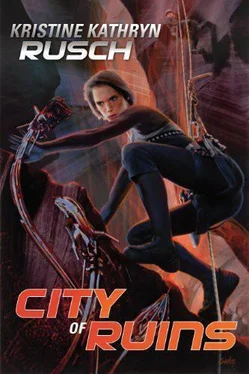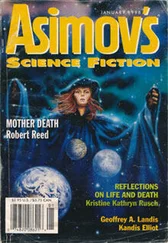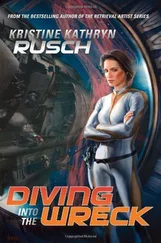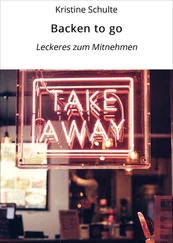“You should ask for more booze next time,” he says.
Mikk stifles a laugh. Roderick turns his chair away so that his grin isn’t apparent.
“I should,” I say in mock agreement.
Kersting’s name fits him. He is rounder than the others, although he manages to stay in shape. His chubby cheeks and tufts of brown hair accent the roundness. His love of beer is the reason for his extra weight. Much of what we do on missions with Kersting is designed to keep him from that extra glass with dinner.
Kersting doesn’t notice. He slides into the nearest chair and eyes the covered dishes.
“We have a lot to report,” I say. “The hotel has thoughtfully provided dinner. Let’s serve ourselves, and then conduct the meeting over food.”
I don’t have to tell people twice to grab plates. Fortunately the hotel was wise enough to repeat the same courses on both ends of the sideboard. Everyone dishes up platefuls of food, then returns to their seats. I take a small bit of each dish. Nothing is recognizable.
I set my plate in front of the head of the table, but I don’t eat. Everyone else tucks in.
I give the overall report of what’s below, spending quite a bit of time on the black walls and the strange lighting.
“I wasn’t able to see more than the first death area,” I say, “but it looks like the Vaycehnese haven’t let anyone back there. There’s a lot to be excavated.”
Tamaz lifts his head when he hears that. “We’re going to dive,” he says with a smile.
“We are,” I say. “But we’re going to run this like any other mission. Mapping first.”
“I would think there’s also a problem.” Kersting has finished his ale and taken a glass of sparkling water. “If the guide is right, then that stuff is in a stealth-tech area.”
“Possible,” I say. “It’s something we’re going to have to work out.”
Because if it all is truly in a stealth-tech area, then I’m the only trained diver. The Six will have to dive with me, and that will be like taking tourists on a dangerous deep-space dive.
“What I’m most interested in tonight are two things,” I say. “I want to know what the rest of you discovered in your researches today. And I also want to know if the scientists have any early thoughts on the black stuff. First the black stuff.”
Bridge glances at the other scientists. He’s the one who spent the most time with it today, the only one who could really postulate anything.
Still, I like the way he included the others, even if it was only with just a look.
“It’s really preliminary,” he says. “We took a lot of samples, not just from the chamber they took us into, but from the area around the top, any edge that we could find. Then I went deeper into the chamber, away from the collapsed area, as far back as the cart pilot would let me go without your approval, and took some samples there.”
“I’m assuming they’re different,” Stone says. A few of the others glare at her, but she ignores them. I may be in charge, but Stone is going to pretend she is.
“That’s the surprising thing,” Bridge says. “With a cursory analysis from the equipment we brought with us, they’re not. It’s the same material—and here’s the curious thing—it’s the same age.”
“Meaning what?” Mikk asks. He’s always the one who is the most impatient with science. He only wants to know how to use it, not what makes it work.
“I have no idea. I’m not even sure what we’re dealing with,” Bridge says. “The components are unbelievably small and not something we’ve seen before.”
“Infectious?” Ivy asks, rubbing her fingertips together.
Bridge gives her such a look of annoyance that I wonder if she’s been asking him that question all day. I don’t know why she’s so worried. She wore gloves.
“I don’t know if they’re infectious,” Bridge says. “Certainly not in the sense that we understand it. But something that small and powerful might do some harm if it gets into the lungs. I think until we know what we’re dealing with, we wear masks.”
“Lovely,” Stone mutters.
“Are the guides right?” I ask. “Is this a natural material?”
“Not on any world I’ve been to,” says Bridge. “I’m guessing and we’re going to have to do studies, but I’m pretty sure these are man-made.”
“That magically appear when a wall collapses?” Carmak asks. She seems to have perked up now that she’s eaten and had some coffee. She actually sounds intrigued now instead of overwhelmed like she had late this afternoon.
“Yes, possibly,” Bridge says. “They formed quickly, reinforced the collapsed walls, and created the shaft where there was none. And then there’s the matter of the lights.”
That catches my attention. The lights fascinated me from the moment we went below.
“What about them?” Stone asks.
“They form too. And they seem to respond to some kind of stimuli. In other words, they turn off when they’re not needed.”
“I’m pretty sure that’s a motion sensor of some kind,” I say. I explain what happened in the corridor.
“Built into that black stuff?” Mikk asks. “This stuff is sounding more and more amazing all the time.”
“Why shouldn’t it be?” Ilona says. “If the same people who built this built stealth tech, then of course this is amazing. Stealth tech is.”
“Amazing in how fast it kills,” Roderick says.
Both Mikk and Roderick, who saw a member of our team die in the Room of Lost Souls, loathe stealth tech. They’re here to conquer it, not learn everything they can about it.
“It’s amazing how it works,” Ilona says primly, as if she disapproves of their attitude.
I’m still not sure we’re dealing with stealth tech here, but I am sure that whoever made that black stuff had more scientific knowledge than we could pretend to have.
Since our science is the best it has been in thousands of years and we don’t understand this stuff, that means it’s ancient science. The ancients knew so much more than we ever will. I constantly find myself in awe of them.
“We’re here to find out whether or not those fourteen archeologists died in stealth-tech accidents,” I say. “Aside from my discovery today, did anyone learn more about that?”
“It’s hard to find information,” says Gregory, one of the scientists. His narrow face is wan, and I wonder if he’s getting much sleep. He doesn’t like travel, although he’ll do it when he has to. He’s always the last to volunteer for an away mission and the first to volunteer to go home.
“None of the officials want to talk to us.” He’s playing with his fork as he speaks, turning it upside down, banging the end, and then repeating the procedure. “They wouldn’t even point us to the scientific labs around here.”
One of the other scientists, a slightly overweight man named Lentz, nods. “I finally gave up and went to the universities. Vaycehn has three, and they’re all well known. I wasn’t allowed to contact any of the science departments directly, although in the cafeteria, I ran into a scientist I knew from a few conferences. He says they’d love to meet with us, but Vaycehn has regulations about sharing potentially difficult information with outsiders, and so in order to have a formal discussion, we’d have to spend months going through channels.”
“I hadn’t heard that part about channels until today,” Ilona says before I can ask her why we haven’t gotten all our permissions lined up.
“What does ‘potentially difficult’ mean?” Bridge asks.
Lentz smiles. “I asked that, too, and he answered me. Anything that could interfere with the tourist trade. The caves are the primary example because many of them are in the oldest areas of the city. People love to visit the ruins.”
Читать дальше











